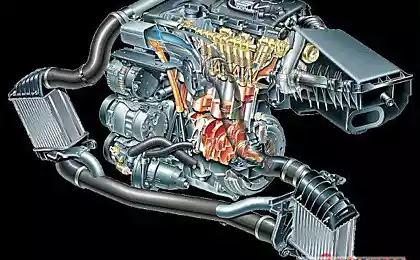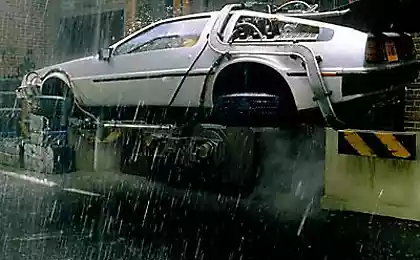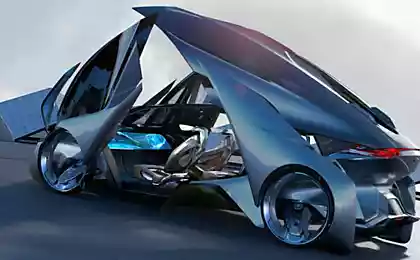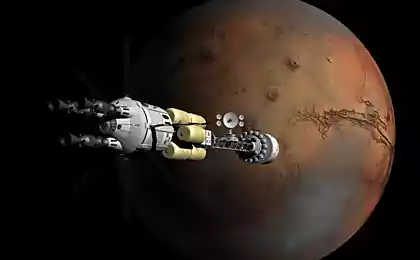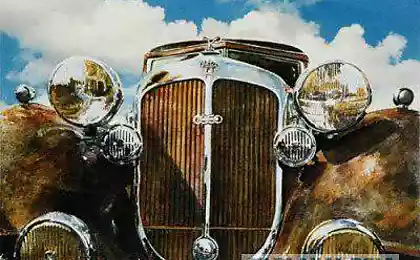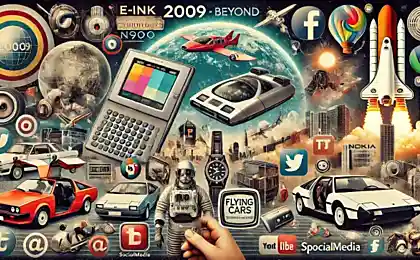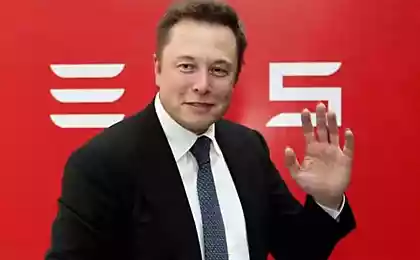535
Flying cars and trips to Mars - end of the future
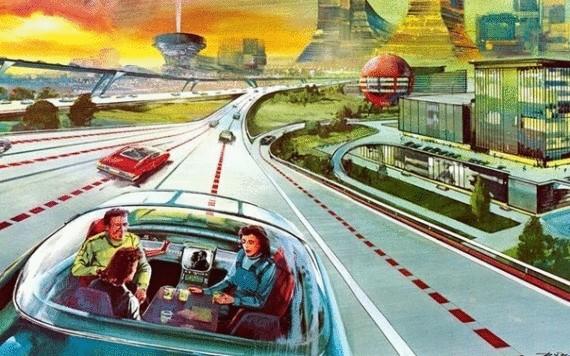
The XXI century was nothing like the predictions of fifty years ago. No intelligent robots, no flying cars or cities on other planets. Worse, we are no closer to such a future. Instead we have the iPhone, Twitter and Google, but is it an adequate substitute? However, they are still using the operating system appeared in 1969.
More and more people are beginning to suspect that there is something wrong. The impression that technical progress, if not stopped, then at least failed. Frivolous gadgets change every month like clockwork, and the significant problems that seemed near and inevitable, somehow, forgotten. The writer Neal Stephenson has tried to articulate these concerns in the article "Innovation starvation":
"One of my first memories: I sit in front of bulky black-and-white TV and watching one of the first American astronauts sent into space. The last launch of the last Shuttle I saw on the widescreen LCD panels when I was 51 years old. I watched the space program is in decline, with sadness, even bitterness. Where is the promised toroidal space station? Where's my ticket to Mars? We are unable to repeat even the space achievements of the sixties. I'm afraid this suggests that society has forgotten how to cope with really challenging tasks."
Stevenson echoed by Peter Thiel, cofounder of Paypal and first external investor in Facebook. The article, which he published in the edition of National Review harshly titled "the End of the future":
"Technical progress is clearly lagging behind the magnificent hopes of the fifties and sixties, and this is happening on multiple fronts. Here is the most literal example of the slow progress: the speed of our movement ceased to grow. The long history of the emergence of ever-faster modes of transport, which began sailing in XVI-XVIII centuries, continuing the development of Railways in the nineteenth century and the advent of automobiles and aviation in the twentieth century dramatically reversed in 2003, when off to the scrap Concorde, the last supersonic passenger aircraft. Amid this regression and stagnation, those who continue to dream of spaceships, holidays on the moon and sending astronauts to other planets in the Solar system, they seem to be aliens".

This is not the only argument in favor of the theory that technical progress is slowing. Its advocates propose to look at least in computing. All the fundamental ideas in this area at least forty years. Unix in a year will be 45 years. SQL was invented in the early seventies. Then there was the Internet, object-oriented programming and graphical user interface.
Besides the examples, there are numbers. Economists estimate the impact of technical progress on the rate of productivity growth and changes in gross domestic product of the countries, where the introduction of new technologies. Changes in these indicators during the twentieth century confirm that the suspicions of the pessimists are not without reason: the growth rate falling for several decades.
In the United States the impact of technical progress on gross domestic product reached a peak in the mid-thirties of the XX century. If labor productivity in the U.S. continued to grow at a rate defined in the years 1950-1972, by 2011 it would have reached values that were a third higher than in reality. In other first world countries, the picture is about the same.
In 1999, economist Robert Gordon published a paper in which he suggested that rapid economic growth, which is usually associated with technological progress, has in fact been time-limited surge:
"The explanation is not so much a slowdown after 1972, many of the causes of the acceleration that occurred about 1913 and opened a brilliant sixty-year period between the First world war and the early seventies, during which the growth of labor productivity in the United States ahead of everything that was observed before or after those times."
Gordon believes that the surge has caused a new industrial revolution that took place in this period. At the end of XIX and the first half of the XX century coincided with electrification, the spread of internal combustion engines, and breakthroughs in the chemical industry and the emergence of new forms of communication and new media, in particular cinema and television. Growth continued until, yet their potential has not been expended to the end.
But what about electronics and the Internet, which became truly popular only in the last twenty years? From the point of view of Gordon, they have much less impact on the economy than electricity, internal combustion engines, communications and chemical industry — the "big four" industrial revolutions of the early twentieth century — and is much less important:
The "big four was much more powerful source of productivity growth than anything that has appeared in recent years. Most inventions that we see now are "derived" from the old ideas. For example, VCRs have combined TV and movies, but the fundamental effect of their appearance cannot be compared with the effect produced by the invention of one of their predecessors. The Internet is also mostly leads to the substitution of one form of entertainment to another — and only".
Peter Thiel takes the same view: the Internet and gadgets is good, but by and large all the same stuff. This idea is concisely expressed in the motto of his investment firm, Founders Fund: "We wanted flying cars and got 140 characters Twitter". Column in the Financial Times, written by Thiele co-authored with Garry Kasparov, develops the same idea:
"We can send pictures of cats on the other side of the world through phones and look at them the same old movie about the future, while being in the subway, built a hundred years ago. We can write a program that emulates the futuristic landscapes, but the real landscape around us has hardly changed over half a century. We have not learned to protect ourselves from earthquakes and hurricanes, to travel faster or live longer."
On the one hand, it's hard not to agree. Nostalgia for the simple and optimistic petrobudowa is perfectly natural. On the other hand, complaints of pessimists, despite the graphs and numbers they cite do not combine with the insane reality outside the window. She's really not very similar to the dreams of the sixties, but the similarities with outdated dreams — a dubious criterion for determining values.
Ultimately, futuristic spaceships and flying cars — this is a pretty ingenuous idea. Both — just an extrapolation into the future of what existed in the past. The flying car is just a car, and any spaceship with captain kirk at the head is a fantastic variation on the theme of a warship during the Second world war.
If you just read the news today, it appears that:
— Successfully tested the Autonomous self-driving cars able to drive on ordinary roads without human help. Local authorities in the United States are already discussing what to do with them: in the normal rules of the road machine without drivers fit poorly.
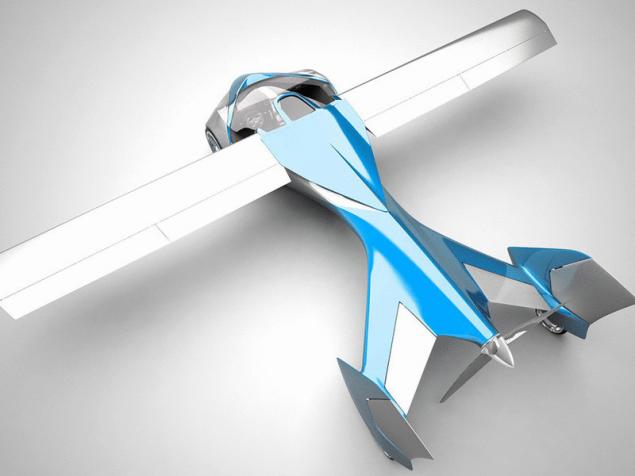
The lion's share of exchange operations do not people, and special programs, performing thousands of transactions per second. At this speed they can not control, so most of the time they act on their own initiative. Unexpected combinations of algorithms have led to immediate market collapses, and long investigations do not always find the cause of the incident.
— The main weapons of the United States in the middle East imperceptibly become semi-drones, controlled via satellite from another continent. And it — technology of the nineties. In laboratories being tested Autonomous robots and flying, and ground.
— At the end of the year, Google will release electronic glasses that automatically find and show the user information that, in their opinion, the most useful to him at the moment. In addition, points able at any moment to record what he sees. Oh, and is built-in voice translator for many languages.
— 3D printers, on the one hand, fell to such a level that they can buy almost everyone, and on the other — reached the resolution at which it is possible to print objects with parts with a size of about 30 nanometers. In order to take pictures printed, requires an electron microscope.
— The idea of a regular video cable can hide inside a full, but very small computer running Unix that until recently would have seemed absurd. Now it is a reality: easier for developers to use a ready-made single-chip system than to develop a specialized microcontroller.
This is not an enumeration of the most amazing things, but only what lies on the surface. Actually, this list can be continued indefinitely — especially if close to us except for information technology, touch technology, material Sciences and other emerging, but not very human-readable from the street areas of knowledge.
Bored? This is because a large seen from a distance, and we were in the epicenter. Habit prevents us from noticing how strange things happen around.
Call all this little things, not worthy of special attention, as does Thiel, will not work. Each of these inventions, even the most thoughtless at first sight, has (or at least may have) a huge impact on how people live.
See for yourself. What are the implications of the increasing use of electronic points of Google Glass. Even if not to take into account the fact that they are constantly studying its owner to better understand what information and when can it be required (and that in itself is a very interesting direction of development of interfaces), think about the points built into the camera. Add the face recognition and search in the Internet and think about how it will affect the daily life of the user of such a device. And to create a continuous video archive of his own life (it is also called lifelog)? By chance someone has already sounded the alarm and calls to ban Google Glass — you know that if this device becomes popular, ignore it will be more difficult than mobile phones today.
The self-driving car — is also a blow to traditional way of life. All the consequences that can result from the availability of such technology, it is difficult not only to enumerate but also to predict. Here are a couple of popular predictions. First, self-driving car it is not necessary to wait for the driver in the Parking lot. It can serve not one but several people. This, in turn, will lead to a complete change in the approach to owning a car. Second, the robots behave on the road where careful people. This means that hundreds of thousands of accidents in the year ending in the death of people, can be forgotten. Finally, do not forget about the time people spend behind the wheel. It is free to do other things.
Even such a mundane thing as a cable with a built-in computer is not a small thing. Details in such cases do not happen. The effect of reducing the cost of existing technology is often unpredictable and can exceed the strength of the effect of new inventions. What consequences will further reduce the cost and energy consumption odnorotornyj computers that can run Unix? Read about ubiquitous computing (ubiquitous computing) and sensor networks.
Mobile phones that Thiel is so easily dismissed, do allow you to "send photos of the cats on the other end of the world". But not only cats. With the same ease they allow you to copy and publish on the Internet the gigabytes of sensitive information, caused an international diplomatic scandal. And frivolous means of communication like Facebook, text messages Blackberry and Twitter with its 140 characters reduces the complexity of mass communication, reducing the need for conscious organization of joint actions of groups of people. Even the iPhone, the exemplary symbol of mindless consumerism, on closer examination turns out to be a very important milestone: it has pushed the development of a new generation of computers after chetvertichnogo stagnation.
Why is this not reflected in economic performance? Most likely, finds, but not what I was waiting for economists. The previous industrial revolution led to increased productivity and the emergence of new industries. This, on the contrary, makes the whole industry unviable and displaces a lot of things outside the money economy.
First it felt content producers that can be easily copied, music industry, media, publishers, Hollywood. Their business model from two sides devour the widespread illegal copying and a large number of people suddenly got the opportunity on equal terms with the professionals compete for the attention of the audience.
Look in the folder where you keep pirated films and music, and count how many you would have had to pay for their legal version. This is the amount are unable to consider economists when considering gross domestic product per capita. The value of the product that you have consumed has not diminished from the fact that you didn't pay him a penny, but it is factored out of the economy.
Every successful technology company is destroying the potential profits of thousands of competitors operating in the same market by conventional methods. Craigslist almost single-handedly ruined the market for paid ads, the income from which lived a hundred years of the American newspaper. No traditional encyclopedia can't compete with Wikipedia, which is not even a commercial organization. AirBnB kicks the chair out from under the feet of the hotel industry (only in some niches, but whether there will be), and Uber has greatly complicated the life of a traditional taxi. And so on and so forth.
Meanwhile, industrial robots, implementation of which was delayed due to availability of cheap labour in South-East Asia, are becoming more attractive. Foxconn, one of China's largest electronics manufacturers, is threatening to replace the hundreds of thousands. If so will go, the labour market will follow other markets that are killed by new technologies, and economists will have to invent some other economy.
At least, then definitely no one will come to complain that progress ended. It is not over, it just went where you thought.
Author: Oleg Paramonov
Source: brainswork.ru
A British inventor has created from sheep wool durable material
American family was fined $500 for the garden


